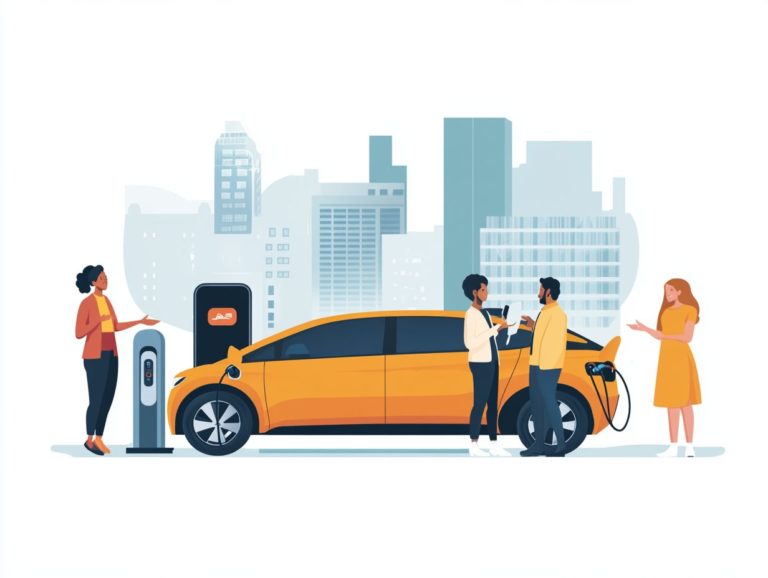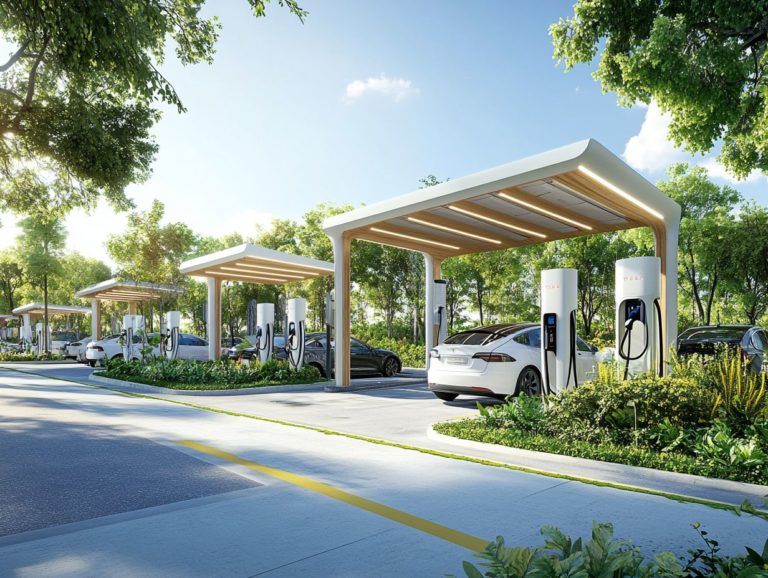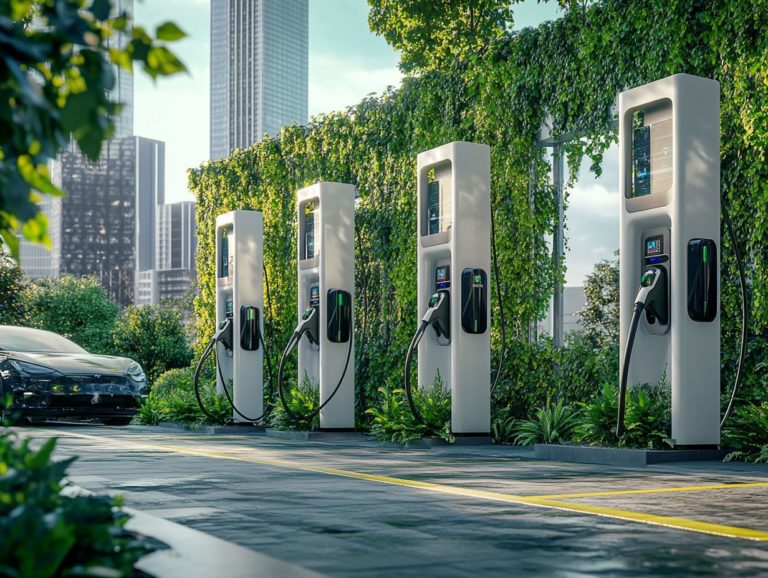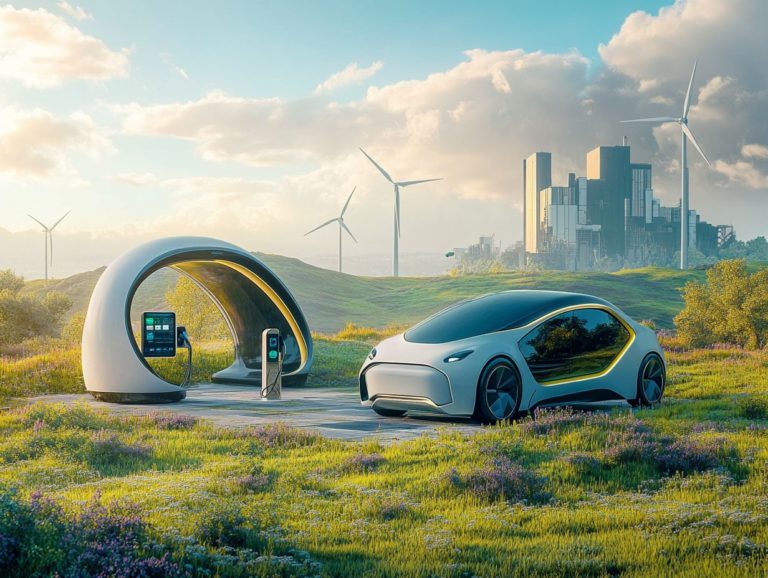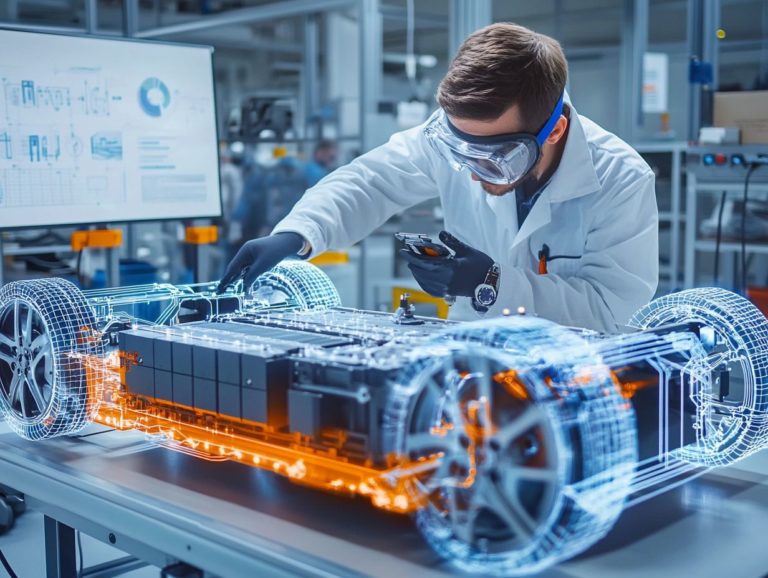Government Incentives for EV Buyers in 2024
As electric vehicles (EVs) continue to gain traction, you may be exploring ways to make your shift to greener transportation more budget-friendly. Government incentives are pivotal in this journey, providing a range of programs aimed at easing the financial strain of purchasing an EV.
Let s dive into the exciting incentives available, examining their environmental and economic impacts while pondering what the future may hold. This article will guide you on how to capitalize on these incentives and highlight other crucial factors to consider before making your purchase.
Embark on this exploration to uncover how you can reap the rewards of going electric!
Contents
- Key Takeaways:
- What are Government Incentives for EV Buyers?
- Current Government Incentives for EV Buyers
- Benefits of Government Incentives for Electric Vehicle Buyers
- Future of Government Incentives for Electric Vehicle Buyers
- How to Take Advantage of Government Incentives for Electric Vehicle Buyers
- Eligibility and Application Process
- Other Factors to Consider When Buying an EV
- Frequently Asked Questions
- What are Government Incentives for EV Buyers?
- What types of Government Incentives are available?
- Do these incentives only apply to new EV purchases?
- How much money can I save with these incentives?
- Are there any income restrictions for these incentives?
- What are the benefits of using an electric vehicle compared to a traditional gas-powered vehicle?
Key Takeaways:

- In 2024, government incentives will be game-changers for EV buyers!
- These incentives benefit the environment by reducing carbon emissions and also provide economic advantages for consumers.
- To take advantage of these incentives, potential buyers should research eligibility requirements and consider additional costs and savings associated with EV ownership.
What are Government Incentives for EV Buyers?
Government incentives for electric vehicle (EV) buyers in North America have undergone a remarkable transformation, largely influenced by legislative actions like the Inflation Reduction Act of 2022. These incentives encompass tax credits, rebates, and various programs designed to promote clean vehicles while assisting you in your transition to greener alternatives.
To truly capitalize on these offerings, it s crucial for you to grasp the IRS regulations that dictate credit eligibility. These regulations include factors like your adjusted income, the vehicle s ID, battery size, and where it was assembled.
This evolving landscape mirrors society’s growing commitment to sustainable transportation solutions, inviting you to be part of a greener future.
Current Government Incentives for EV Buyers
Current government incentives for EV buyers largely center around the Electric Vehicle Tax Credit and the Plug-in Electric Drive Motor Vehicle Credit. These programs are thoughtfully designed to promote the adoption of clean vehicles.
You ll find that these incentives are regulated by IRS guidelines, detailing eligibility criteria based on vehicle specifications and consumer information. Understanding these tax credits can significantly enhance your overall savings as a consumer.
Overview of Existing Programs
The existing programs for electric vehicle (EV) buyers encompass key initiatives such as the Clean Vehicle Rebate Project and various EV charging incentives, all designed to promote the adoption of clean cars. These programs aim to reduce the financial burden you may face when opting for environmentally friendly vehicles, while also fostering the necessary infrastructure for EV integration.
By offering substantial rebates, tax credits, and grants, these initiatives actively encourage your transition from conventional vehicles to electric alternatives. For example, the Driving Clean Assistance Program specifically targets low-income households, providing vital financial support to help you procure an EV, promoting equity in access to these vehicles.
Charging incentives often include generous rebates for home charging installations and subsidies for public charging stations, essential for alleviating range anxiety among prospective buyers like yourself. Eligibility typically takes into account your residency, income levels, and the specific types of EVs purchased, ensuring that the benefits are accessible to a wide range of consumers eager to embrace sustainable transportation.
Act now to take advantage of these amazing incentives before they change!
Benefits of Government Incentives for Electric Vehicle Buyers

The advantages of government incentives for electric vehicle (EV) buyers go far beyond individual savings. They play a crucial role in helping the environment and boosting the economy. Incentives like tax credits and rebates motivate you to embrace electric vehicles, significantly reducing greenhouse gas emissions and supporting the creation of sustainable industries.
As your savings grow, you ll also see increased demand for clean vehicles, driving economic expansion and creating jobs in the EV sector.
Impact on Environment and Economy
Adopting electric vehicles significantly impacts the environment and the economy. You’ll see fewer greenhouse gas emissions while boosting job creation in the clean vehicle sector. This transition helps combat climate change and positions North America as a leader in sustainable transportation technology.
Recent studies suggest that by transitioning to EVs, you could help lower greenhouse gas emissions by up to 70% by 2030. This would be a substantial contribution to global sustainability efforts. The EV industry has already created over 300,000 jobs nationwide, and this figure is expected to double in the next decade as more manufacturers enter the market.
Investing in charging stations and power sources for electric cars is set to stimulate economic growth, potentially adding around $7 trillion to the U.S. economy in the coming years. This dual impact highlights the importance of innovation and technology in achieving both environmental and economic resilience.
Future of Government Incentives for Electric Vehicle Buyers
The future of government incentives for electric vehicle (EV) buyers looks exceptionally promising, with increased interest in understanding tax incentives for EV buyers. Emerging clean vehicle policies showcase a strong commitment to sustainability.
As technological advancements transform the automotive landscape, you can expect IRS regulations, which dictate tax benefits, to evolve. This means you ll receive even more support and encouragement to transition to greener alternatives.
Predictions and Potential Changes
Predictions about the future of electric vehicle (EV) incentives hint at exciting changes shaped by your changing preferences and the latest technological advancements. As you and others seek sustainable transportation options, you ll see new tax credits and programs designed to meet the needs of modern consumers.
These developments could lead to greater flexibility in how benefits are applied. You might enjoy direct rebates at the point of sale instead of waiting for tax season. Additionally, expect to see more state-level initiatives that customize incentives to fit local markets and demographics, encouraging wider adoption in diverse communities.
The potential for shifts in government policies will largely depend on current consumer behavior trends. Younger generations, including you, are prioritizing eco-friendly practices. This may inspire policymakers to revise existing frameworks and introduce new measures that promote electric vehicles while enhancing public charging infrastructure and supporting innovative mobility solutions.
How to Take Advantage of Government Incentives for Electric Vehicle Buyers

To fully capitalize on government incentives, you need to understand the application process and the credit eligibility requirements tied to tax credits and rebates. Mastering these elements can lead to significant financial advantages when purchasing your electric vehicle.
Don t miss out on these amazing benefits for electric vehicle buyers!
Eligibility and Application Process
Don’t miss out on these valuable opportunities! Eligibility for government incentives often depends on specific application requirements, including your taxpayer ID number and other essential consumer information that must be accurately submitted to qualify for benefits like the electric vehicle tax credit. Understanding these criteria is crucial for ensuring a smooth application process.
Gather all necessary documentation, such as proof of purchase, vehicle specifications, and, if applicable, income statements to confirm your eligibility. It’s not uncommon for buyers to encounter challenges like discrepancies in documentation or misinterpreting submission deadlines.
To navigate these hurdles effectively, stay organized and informed to enhance your chances of successfully securing these financial incentives, ultimately aiding your transition to electric vehicles.
Other Factors to Consider When Buying an EV
When contemplating the purchase of an electric vehicle (EV), assess factors that extend beyond mere incentives.
Consider the total costs, potential savings, and the long-term advantages that come with owning an electric vehicle. This thorough understanding equips you to make informed financial decisions that align seamlessly with your goals for a greener lifestyle.
Costs and Savings Beyond Incentives
The total cost of ownership for an electric vehicle (EV) involves several vital factors, including maintenance, energy savings, and anticipated resale value. Understanding these elements allows you to grasp the true affordability of your EV purchase.
By factoring in the maintenance requirements, you ll quickly realize that the frequency and costs of servicing an EV are generally lower than those of traditional gasoline vehicles, which often demand more frequent attention.
The energy savings from charging an EV usually far exceed the costs of electricity, especially as fuel prices continue to soar.
While resale values might experience some fluctuations, studies show that electric vehicles tend to retain their value quite well over time, making them a savvy choice for discerning consumers. Collectively, these considerations significantly shape your financial decisions, leading to considerable savings and a more sustainable lifestyle.
Frequently Asked Questions
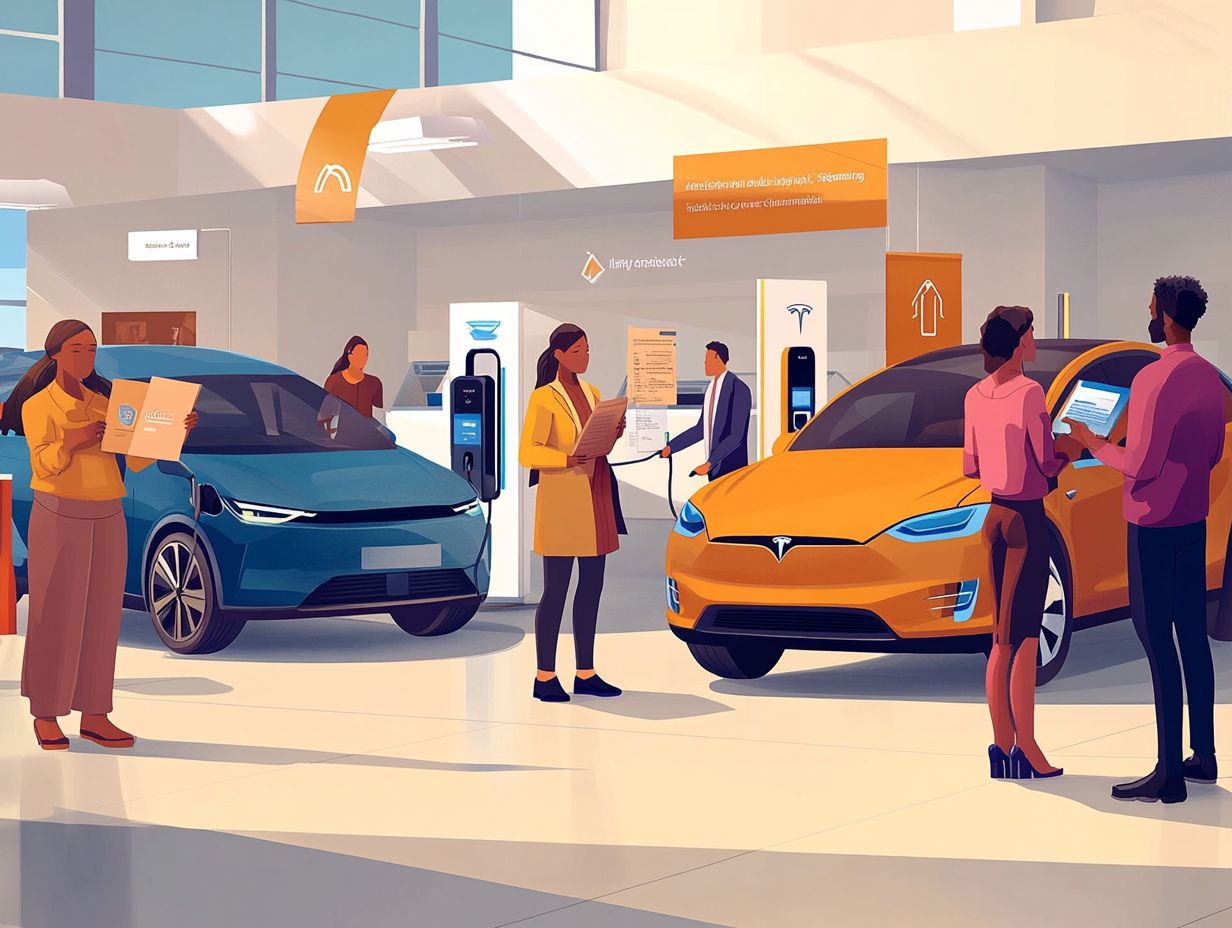
What are Government Incentives for EV Buyers?
Government incentives are financial or non-monetary benefits offered by the government to encourage the purchase of electric vehicles. These incentives aim to make EVs more affordable and accessible to consumers.
What types of Government Incentives are available?
There are various types of incentives available for EV buyers, including:
- Tax credits
- Rebates
- Grants
- Subsidies
These incentives can vary by state or country, so it’s essential to check with your local government for specific details.
Do these incentives only apply to new EV purchases?
No, in most cases, incentives apply to both new and used EV purchases. However, the eligibility criteria may differ for used EVs, so it’s essential to check with your local government for more information.
How much money can I save with these incentives?
The amount of money you can save depends on the type of incentive and your location. For example, tax credits can save you a certain percentage of the vehicle’s cost, while rebates offer a set amount of money towards the purchase. It’s best to research and compare different incentives to see which one can save you the most money.
Are there any income restrictions for these incentives?
Yes, some incentives may have income restrictions. This means that only individuals or households below a certain income level are eligible. However, these restrictions can vary, so it’s crucial to check with your local government for specific details.
What are the benefits of using an electric vehicle compared to a traditional gas-powered vehicle?
Electric vehicles come with government incentives and offer many advantages. You can spend less on fuel, enjoy a smoother ride, and help reduce emissions.
They also require less maintenance and last longer than traditional gas-powered vehicles. This makes electric vehicles a smart choice for your wallet and the planet!
Join the movement towards cleaner, quieter driving today!


